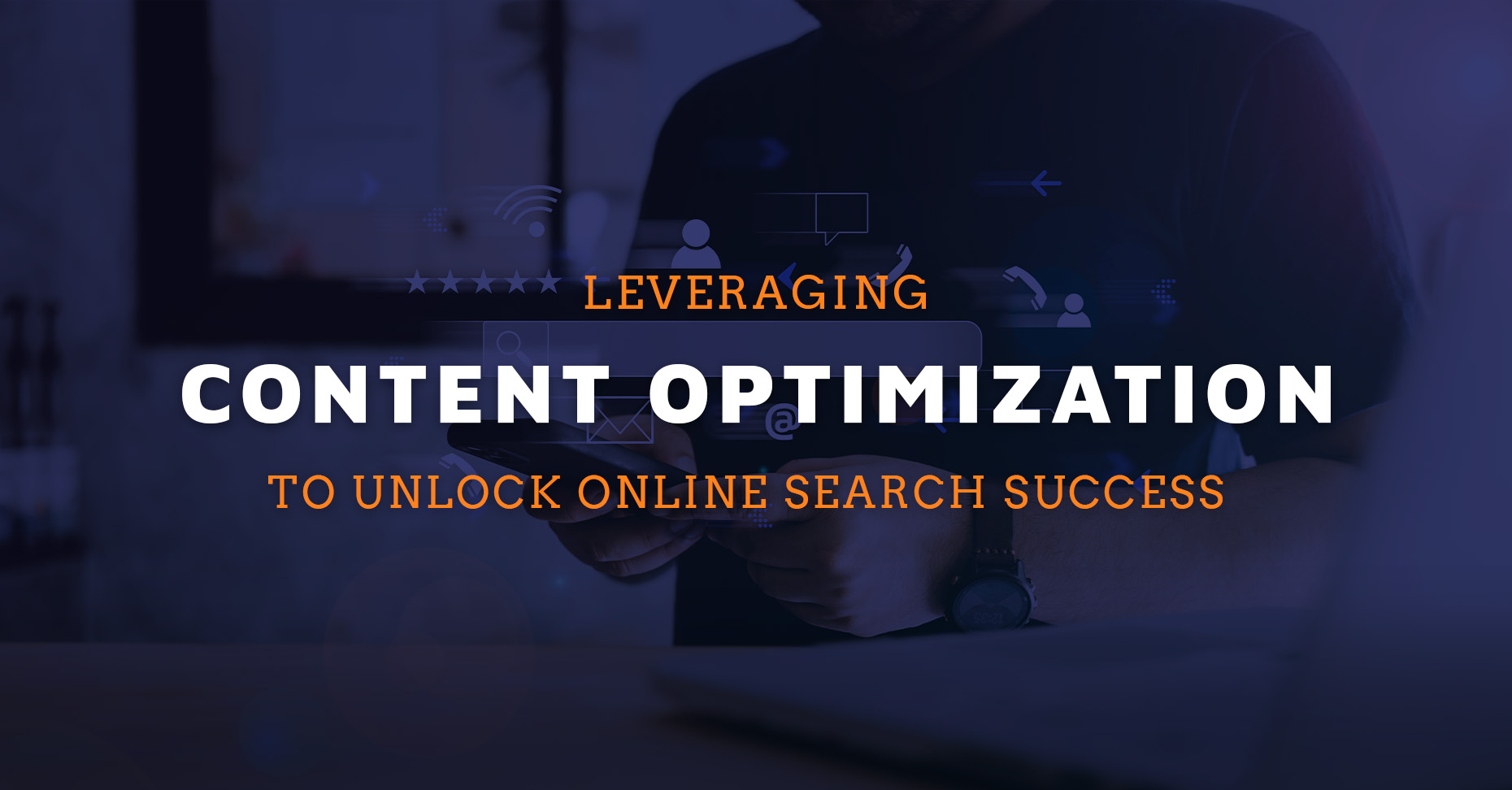Content Optimization Unlocks Online Search Success
 With more and more consumers shopping for goods and services online, content optimization is essential for any business aiming to maximize online visibility and reach potential customers. Whether your business publishes a blog, maintains a website, or owns an e-commerce platform, understanding the fundamentals of search engine optimization (SEO) and keywords will significantly enhance your content’s effectiveness. It will also help drive more visitors – and possible business leads - to your website.
With more and more consumers shopping for goods and services online, content optimization is essential for any business aiming to maximize online visibility and reach potential customers. Whether your business publishes a blog, maintains a website, or owns an e-commerce platform, understanding the fundamentals of search engine optimization (SEO) and keywords will significantly enhance your content’s effectiveness. It will also help drive more visitors – and possible business leads - to your website.
In this blog, we’ll delve into content optimization, exploring the significance of SEO and the strategic use of keywords to help your company create and optimize content that stands out in search engine rankings and engages your target audience.
SEO is optimizing your company’s web content to improve its visibility in search engine results pages (SERPs). SEO is crucial because search engines like Google rely on complex algorithms to determine the relevance and quality of content, thereby influencing its ranking.
Our marketing strategists and SEO specialists help companies follow SEO best practices to enhance their website’s visibility and attract organic traffic from search engines. Here are four components of SEO that we focus on with our clients.
Key Components of SEO
On-Page Optimization: On-page SEO focuses on optimizing individual web pages to improve rankings and organic traffic. This includes factors like keyword usage, meta tags, URL structure, headings, and content formatting.
We pay attention to keyword placement and density, ensuring content remains natural and user-friendly.
Off-Page Optimization: Off-page SEO involves optimizing factors outside your company’s website that influence its visibility, such as backlinks, social media shares, and online mentions.
We help our clients build a strong backlink profile by exploring potential guest posting, influencer collaborations, and content promotion. All these tactics can boost your company website’s authority and improve its search rankings.
Technical SEO: Technical SEO consists of optimizing the technical aspects of your website, making it easier for search engines to crawl, index, and understand your content. Or SEO team looks at things such as optimizing site speed, mobile responsiveness, URL structure, XML sitemaps, and ensuring proper canonicalization.
User Experience (UX): Search engines prioritize websites that offer a positive user experience. When working with our clients, we focus on factors like mobile-friendliness, intuitive navigation, easy-to-read content, and fast-loading pages. A good UX improves SEO and keeps visitors engaged, reducing bounce rates.
Keywords: The Building Blocks of Optimization
Keywords are the words and phrases that users type into search engines when looking for information, products, or services. We help clients incorporate relevant keywords in their content to assist search engines in understanding its relevance to users’ queries.
When working with clients to improve keyword selection, we keep these things in mind:
Keyword Research: We begin by conducting thorough keyword research to identify the terms and phrases a client’s target audience is searching for. We utilize tools like Google Keyword Planner, SEMrush, or Moz to discover popular and relevant keywords in your niche.
Long-Tail Keywords: Long-tail keywords are longer, more specific phrases that target a narrower audience but often have higher conversion rates. For some businesses, incorporating long-tail keywords in their content can help them attract highly relevant traffic and increase the chances of conversions.
Keyword Placement: We can’t stress enough that strategically placing keywords in vital areas of content, such as titles, headings, meta descriptions, and throughout the body, is critical.
We help ensure the content flows naturally and is not over-stuffed with keywords, which can negatively impact user experience and search engine rankings.
Content Relevance: When optimizing content with keywords, it’s important to prioritize relevance. We help our clients craft high-quality, informative, engaging content that satisfies user intent. Search engines favor content that answers user queries effectively and provides value.
Monitoring and Iteration: A key part of an SEO strategy includes continuously monitoring the performance of keywords and making necessary adjustments based on their effectiveness. We help clients track rankings, organic traffic, and engagement metrics to refine content optimization strategies over time.
Content optimization is an ongoing process that combines SEO best practices and strategic keyword usage. By implementing these techniques, we help our clients significantly enhance their website’s visibility, attract organic traffic, and engage their target audience.
Our Recent Posts
Search
Posts by Tag
- Digital Marketing (77)
- Marketing Strategy (69)
- Agency (55)
- Content Marketing (31)
- Social Media Marketing (29)
- SEO (28)
- News (26)
- Advertising (24)
- Website Design (15)
- branding (14)
- Graphic Design (10)
- AI (4)
- HubSpot (2)
- Web Development (2)
- Business (1)
- Marketing Strategies (1)
- Mobile & Web (1)
- PR (1)
- Professional Development (1)
- SEM (1)
- Sales and Marketing (1)
Explore our suite of services and how they can enhance your business. Contact us today to learn more!
